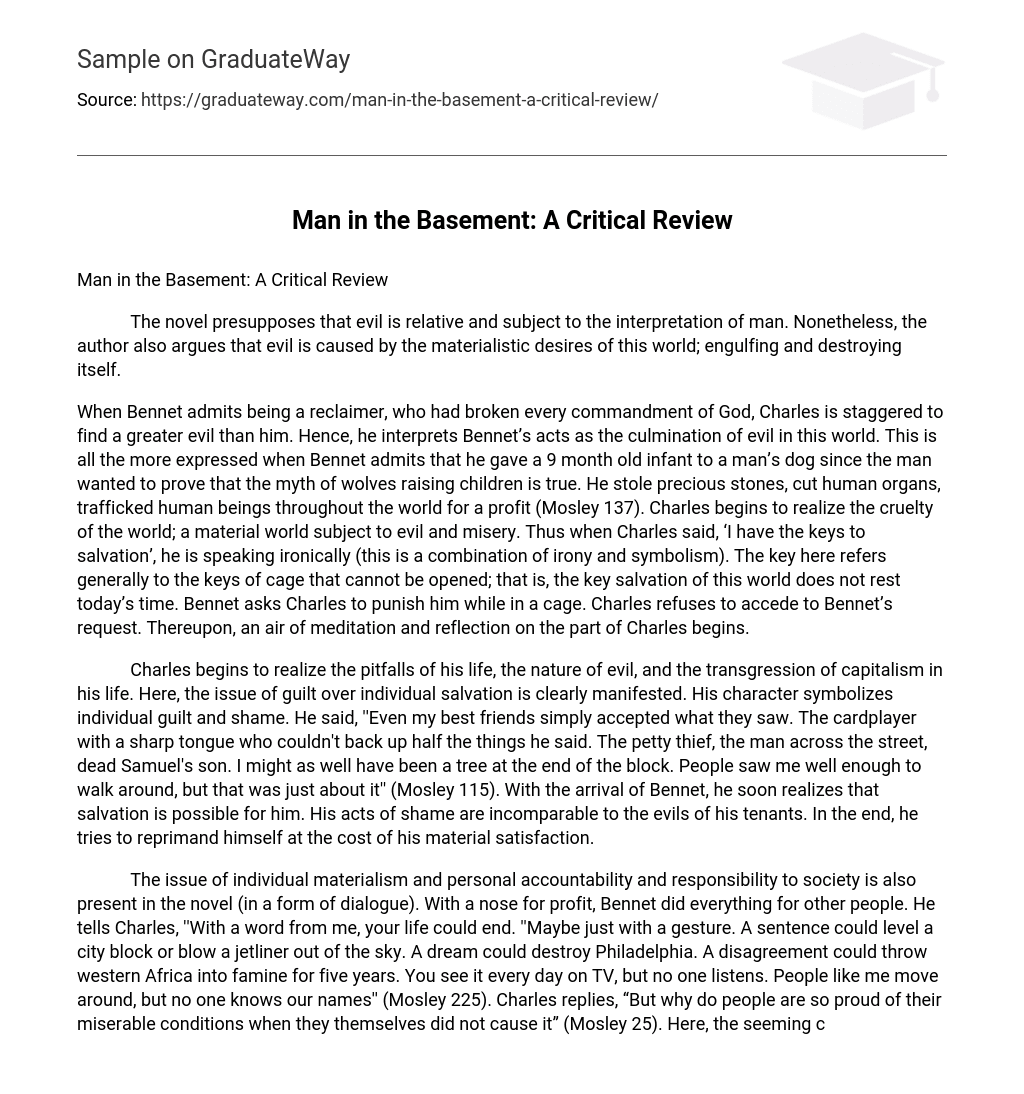The novel presupposes that evil is relative and subject to the interpretation of man. Nonetheless, the author also argues that evil is caused by the materialistic desires of this world; engulfing and destroying itself.
When Bennet admits being a reclaimer, who had broken every commandment of God, Charles is staggered to find a greater evil than him. Hence, he interprets Bennet’s acts as the culmination of evil in this world. This is all the more expressed when Bennet admits that he gave a 9 month old infant to a man’s dog since the man wanted to prove that the myth of wolves raising children is true. He stole precious stones, cut human organs, trafficked human beings throughout the world for a profit (Mosley 137). Charles begins to realize the cruelty of the world; a material world subject to evil and misery. Thus when Charles said, ‘I have the keys to salvation’, he is speaking ironically (this is a combination of irony and symbolism). The key here refers generally to the keys of cage that cannot be opened; that is, the key salvation of this world does not rest today’s time. Bennet asks Charles to punish him while in a cage. Charles refuses to accede to Bennet’s request. Thereupon, an air of meditation and reflection on the part of Charles begins.
Charles begins to realize the pitfalls of his life, the nature of evil, and the transgression of capitalism in his life. Here, the issue of guilt over individual salvation is clearly manifested. His character symbolizes individual guilt and shame. He said, ”Even my best friends simply accepted what they saw. The cardplayer with a sharp tongue who couldn’t back up half the things he said. The petty thief, the man across the street, dead Samuel’s son. I might as well have been a tree at the end of the block. People saw me well enough to walk around, but that was just about it” (Mosley 115). With the arrival of Bennet, he soon realizes that salvation is possible for him. His acts of shame are incomparable to the evils of his tenants. In the end, he tries to reprimand himself at the cost of his material satisfaction.
The issue of individual materialism and personal accountability and responsibility to society is also present in the novel (in a form of dialogue). With a nose for profit, Bennet did everything for other people. He tells Charles, ”With a word from me, your life could end. ”Maybe just with a gesture. A sentence could level a city block or blow a jetliner out of the sky. A dream could destroy Philadelphia. A disagreement could throw western Africa into famine for five years. You see it every day on TV, but no one listens. People like me move around, but no one knows our names” (Mosley 225). Charles replies, “But why do people are so proud of their miserable conditions when they themselves did not cause it” (Mosley 25). Here, the seeming contradiction between suffering and evil is magnified. Bennet wants to explain it; Charles wants to deny it. The result is a great polemic struggle between two ideologies of the same level.
Thus, the materialistic desires of an individual are coalesced with the materialistic demands of other people, bringing undesirable effects to the society. The effects are magnified by the fact that these people remain unaccountable to the society; that is, their evils remain unpunished.
Here, Charles realizes the importance of society’s values but in the end, Charles struggles to concretize it.
Work Cited
Mosley, Walter. MAN IN MY BASEMENT. New York: Little, Brown & Company, 2003.





